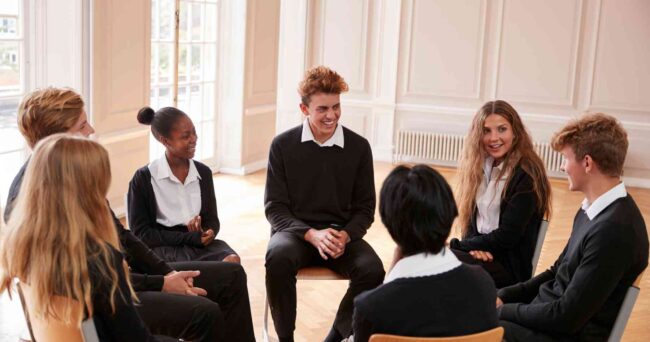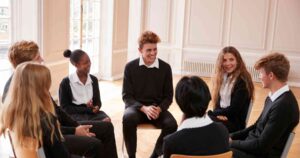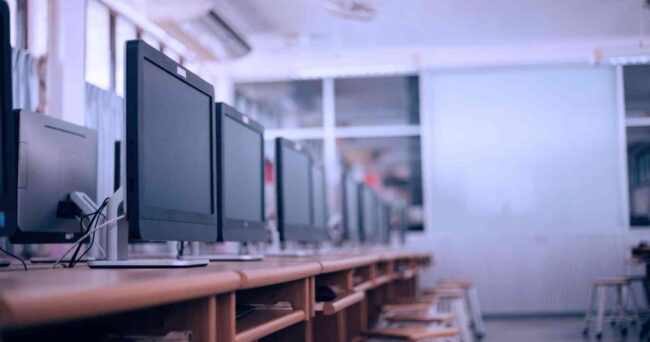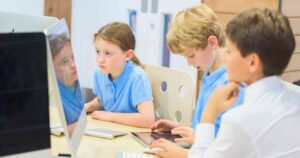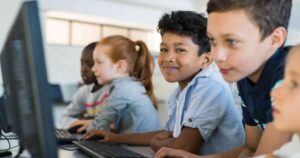The world of education is constantly evolving, and traditional classroom methods are no longer the sole pathway to effective learning. In recent years, educators and researchers have recognized the immense value of experiential learning—an innovative approach that propels students beyond the boundaries of textbooks and empowers them to become active participants in their own education. This article will delve into the multifaceted benefits of experiential learning, highlighting how it enhances critical thinking skills, fuels engagement and motivation, facilitates long-term retention of knowledge, fosters collaboration and communication skills, bridges the gap between theory and practice, and shares a case study of Riverside College that exemplifies successful implementation.
What is experiential learning in education?
Experiential learning within education is a dynamic approach that goes beyond traditional classroom instruction. It involves creating opportunities for students to engage in hands-on, real-world experiences that allow them to apply what they have learned in the classroom to practical situations. Through experiential learning, students actively participate in activities, experiments, field trips, and projects that immerse them in the learning process. This approach fosters critical thinking, problem-solving skills, collaboration, and personal growth, as students gain a deeper understanding of concepts by experiencing them firsthand. Experiential learning ignites a passion for learning, enhances motivation, and prepares students for success in their future endeavours by bridging the gap between theory and practice.
Developing Critical Thinking
Skills through Experiential Learning Experiential learning cultivates critical thinking skills in students by engaging them in hands-on experiences that mimic real-world scenarios. This section will explore how experiential learning sparks curiosity, encourages problem-solving, and promotes independent thinking. By actively participating in tasks and projects, students are prompted to analyze problems from multiple perspectives and develop innovative solutions. This process not only deepens their understanding of concepts but also equips them with the essential skill of critical thinking, enabling them to tackle challenges beyond the confines of the classroom.
Igniting Engagement and Motivation in the Learning Process
Experiential learning increases student engagement and motivation by making education relevant and relatable. This section will discuss how experiential learning taps into students’ intrinsic motivation, fostering a genuine desire to explore and learn. By immersing students in real-world experiences, educators ignite their curiosity and captivate their interest. The hands-on nature of experiential learning creates a dynamic and interactive learning environment, where students actively participate in their own education and develop a sense of ownership over their learning journey.

Enhancing Long-Term Retention of Knowledge
Promotes long-term retention of information by actively applying knowledge in practical situations. This section will explore how experiential learning facilitates deep understanding, contextualizes concepts, and creates lasting memories extending beyond the classroom. By engaging in real-world experiences, students grasp theoretical concepts and witness their practical applications. The direct involvement in meaningful activities solidifies their understanding and engrains the knowledge in their long-term memory, ensuring a higher retention rate compared to passive learning approaches.
Fostering Collaboration and Communication Skills
Creates opportunities for students to collaborate and communicate effectively. This section will delve into how experiential learning promotes teamwork, empathy, and effective communication, preparing students for success in their future personal and professional lives. Through group projects and real-world simulations, students learn the value of collaboration and develop essential interpersonal skills. They navigate diverse perspectives, negotiate solutions, and practice articulating their ideas, fostering an environment that encourages open dialogue and mutual respect.
Bridging the Gap Between Theory and Practice
It bridges the gap between theoretical knowledge and practical application. This section will explore how experiential learning provides students with a deeper understanding of concepts, connects theory to practice, and prepares them for real-life challenges and opportunities. By engaging in hands-on experiences, students witness firsthand the relevance and application of theoretical concepts in real-world contexts. This connection between theory and practice not only enhances their understanding but also equips them with the skills and confidence to apply their knowledge beyond the classroom.

Implementing Experiential Learning at Riverside College
Riverside College, a leading educational institution dedicated to holistic development, serves as a compelling case study for the successful implementation of experiential learning. This section will showcase how Riverside College integrates experiential learning across subjects and grade levels. At Riverside College, science classes go beyond textbooks as students conduct experiments in fully equipped laboratories, enabling them to observe scientific principles in action.
In history classes, students embark on immersive field trips to historical sites, immersing themselves in the rich narratives of the past. By integrating experiential learning into its curriculum, Riverside College fosters a vibrant learning environment where students actively explore, inquire, and apply their knowledge in real-world settings.
Experiential learning activities involve hands-on, real-world experiences that actively engage students in the learning process. Examples include field trips, simulations, service-learning projects, experiments, collaborative projects, internships, outdoor education, and reflection activities. These activities allow students to apply theoretical knowledge in practical contexts, develop essential skills, and deepen their understanding of concepts. Through experiential learning, students become more motivated, empowered, and prepared for future challenges.
The impact of experiential learning at Riverside College is evident in the testimonials of teachers, parents, and students. Teachers have witnessed a remarkable transformation in their students’ engagement and enthusiasm as they actively participate in hands-on activities. Parents have observed their children developing a deeper understanding of complex concepts and exhibiting a newfound eagerness to learn. Students express a sense of fulfilment and excitement as they apply their knowledge to solve real-world problems and make meaningful connections between their education and the world around them.
The success story of Riverside College is a testament to the effectiveness of experiential learning in empowering students for lifelong success. By embracing this innovative approach, Riverside College has created an educational environment that not only imparts knowledge but also nurtures essential skills, attitudes, and a genuine passion for learning. The experiences gained through experiential learning at Riverside College lay a solid foundation for students’ future endeavours, equipping them with the critical thinking, collaboration, and adaptability skills needed to thrive in a rapidly evolving world.
Experiential learning example:
One example of experiential learning is a science experiment where students investigate the growth of plants under different environmental conditions. In this activity, students set up multiple plant setups, each exposed to different variables such as light, temperature, or soil composition. They actively monitor and measure the growth of the plants over a designated period, record their observations, and analyze the data collected. Through this hands-on experience, students not only gain practical skills in conducting experiments but also deepen their understanding of plant biology and the factors that influence plant growth. This experiential learning activity promotes critical thinking, data analysis, and the application of scientific principles in a real-world context.
In conclusion, experiential learning represents a paradigm shift in education, offering a host of benefits that traditional classroom methods may struggle to achieve. From fostering critical thinking skills and igniting engagement to enhancing long-term retention of knowledge, promoting collaboration and communication, bridging the gap between theory and practice, and providing a transformative educational experience, experiential learning is a powerful tool for empowering students.
As educators and stakeholders in education, it is our responsibility to unleash the potential of experiential learning and embrace its ability to shape a future where education becomes a catalyst for lifelong growth and achievement. Riverside College stands as an inspiring example of how experiential learning can be successfully implemented and its transformative effects on students’ educational journey. Let us all embark on this journey to unleash the full potential of experiential learning and pave the way for a brighter future.
Criteria for experientiallearning assignments examples
When designing experiential learning assignments in the context of South African schooling, it is important to consider the following criteria:
- Relevance to local context: The assignments should be designed in a way that connects to the local culture, history, and societal issues of South Africa. This ensures that students can make meaningful connections between their learning experiences and their immediate surroundings.
Example: Asking students to explore and document the impact of apartheid on their local community, interviewing local activists or elders who lived through that era.
- Real-world application: Assignments should provide students with opportunities to apply their knowledge and skills to real-world situations. This helps them understand the practical implications of what they are learning and develop problem-solving abilities.
Example: Tasking students with designing and implementing a community service project to address a specific social issue in their neighbourhood, such as organizing a food drive for a local shelter.
- Collaborative learning: Encourage collaboration and teamwork by incorporating group assignments. This allows students to learn from their peers, develop effective communication and interpersonal skills, and appreciate diverse perspectives.
Example: Assigning students to work in groups to create a business plan for a social enterprise that addresses an environmental issue, requiring them to divide tasks, make collective decisions, and present their ideas as a team.
- Experiential components: The assignments should involve hands-on experiences that immerse students in authentic learning opportunities. This can include field trips, practical experiments, simulations, or interactions with professionals in relevant fields.
Example: Organizing a field trip to a local nature reserve, where students actively engage in ecological restoration activities and learn about sustainable environmental practices from park rangers.
- Reflection and self-assessment: Provide opportunities for students to reflect on their experiential learning experiences and assess their own growth and development. Reflection helps students make connections between theory and practice, identify areas for improvement, and develop metacognitive skills.
Example: Asking students to maintain reflective journals throughout a service-learning project, where they document their experiences, challenges, and personal growth, and make connections to their academic learning.
By incorporating these criteria into experiential learning assignments in South African schooling, educators can create enriching and meaningful learning experiences that empower students, deepen their understanding, and foster a sense of civic responsibility and social engagement.

